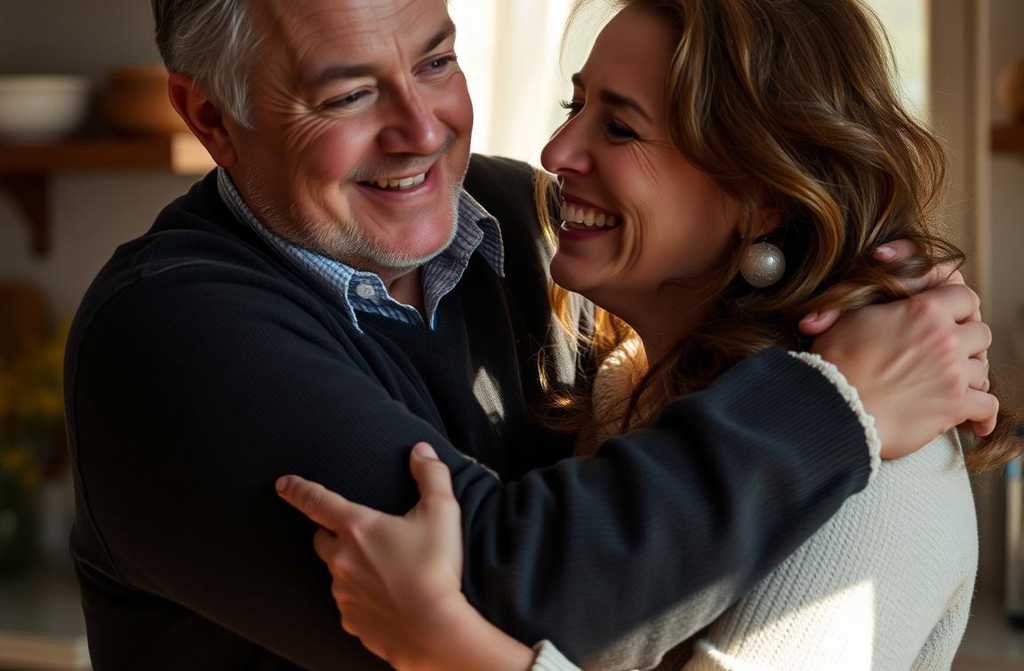**Fell for a Cosy Woman, or So What If They Talk**
*”You’re leaving me for that bumpkin?”* My wife stared at me, bewildered.
*”Dont call her that, please, Elaine. Its decided, Imogen. Im sorry.”* I hurriedly stuffed my things into a bag.
*”I hope you come to your senses soon. It cant end like this. What will your colleagues say? The neighbours? Some unwashed country girlwhat do we tell the children? That their educated father ran off to a farmers wife?”* Imogen twisted a handkerchief in her hands.
*”The children? Theyre grown, thank God. Sophie will be wanting a wedding soon, and Williams already on his own slippery path. Were no example to them. As for the neighbours, colleagues, strangers in the street I dont care what they think. Its my life. I dont peer into anyone elses bedroom, holding a candle.”* I tried to soften the blow, but it was no use. When a marriage ends, the pain is unbearable for both.
Imogen sat at the kitchen table, staring blankly out the window. I didnt feel an ounce of pity for her. Not one. My soul was hollow, emptied.
Imogen was my third wife. The first time I saw her, my heart fluttered, my soul opening to unknown happiness. Elegant, polished, self-assured. I wasnt exactly a slouch myselfknew I turned heads back then. Had my pick of women. In my youth, I fell hard and married fast, only to bolt when the mundane set in. The children only came with Imogen.
I thought shed be my last harbour, my anchor. But alas A melon and a wifeyou dont know them till you bite. Over the years, love went from ripe and juicy to a shrivelled prune. In public, we played the perfect couple, the envy of the street. The neighbours marvelled (or sneered?) at our tidy, quiet household. Passing the gossiping old ladies by the front steps, wed hear their whispers. We sailed past, as if walking a red carpet.
But behind our locked front door, everything changed.
First off, Imogen was no homemaker. The fridge was always bare, laundry piled up, dust gathered in every corner. Yet her nails were always done, her hair sleek, makeup fresh. Imogen believed the world owed *her* its orbit. My wife merely permitted herself to be loved, convinced she was a star of cosmic magnitude. The doors of her soul stayed shutto me, to the children.
My mother lived with us. She endured the chaos in silence before gently steering the grandchildrenSophie and Williamtowards order. They learned to cook, clean, care for themselves. Imogen, fancying herself high society (God knows why), called them by their full namesnever a term of endearment. The children drifted from her, clinging instead to their kind, fair gran.
Imogen forbade me from chatting with the neighbours, dismissing it as *”pointless drivel.”* She offered nothing beyond a stiff *”good day.”*
In our early years, I noticed none of this. I just loved, lived, cherished each day. Sophie was top of her class; William scraped by. It baffled mesame home, same upbringing, yet opposite results. We couldnt drag William even to *decent* grades. He refused to try. By secondary school, he loathed Sophie for her diligence. Sometimes I had to pull them apart mid-fight.
This was the nineties.
After school, William vanished into some gang, gone without a trace. Three years passedno word. We reported him missing, grieved, moved on. As my mother would mutter, eyeing Imogen: *”A lad falls from his horse when his mother saddles it crooked.”*
Imogen would scoff and lock herself in the loo, sobbing.
Hope flickered, though. Then one day, William returneda wreck. Gaunt, scarred, haunted. He brought a wife just as broken, her eyes hollow. We took them in cautiously, afraid to cross him. William watched us sidelong, tense, listening to the silence.
Sophie soon left home. She meant to marry, but no ring came. Instead, she shacked up with some brute, bore no children, turned up bruised but never complaining.
*”Sweetheart, leave him. Hell kill you one day. If you want misery, misery will find you,”* my frail mother pleaded through tears.
*”Gran, its fine. Tristan loves me. The bruises? I slipped on the stairs.”* Sophie bore no resemblance to her schoolgirl self.
Then there was me, old fool that I was, struck by love. After shifts at the factory, I dreaded going homethe rows with William, the distance from Imogen, Mothers jabs: *”Three reckless marriages, children gone feral, wife cant boil an egg”*
At the canteen worked Elainealways cheerful, warm, uncomplicated. Years of lunches, and Id never noticed this rosy-cheeked, plump woman. But her laugh like a babbling spring. Everything was a joke, a smile. A ray of sunshine. I started lingering, chatting. She was three years older, long widowedhusband drowned. Raised a son alone; hed married and moved away.
Elaine was Imogens opposite. Hair in a messy bun, nails short and bare, only lipstickbright as a carrot. Yet she glowed, warm, welcoming. Easy to be with. She served the world in her own way, loved people. A talk with her was like drinking from a fresh well. Her flat always smelled of pies. The fridge brimmed with stew, roast, porridge. Elaine fed neighbours, friendsI couldnt help but fall for such a cosy, *homely* woman.
I courted her properlyflowers, cinema, cafés.
Elaine hesitated: *”Clive, I like you, but youre married. What will your children think? I wont be a homewrecker.”*
At first, I wavered, like any man afraid to take the leap. You step onto thin ice.
Some nights, I stayed with Elaine. Imogen guessed. The *”well-wishers”* filled her inwho, where, when. Our affair became public. Imogen raged, called Elaine *”some grubby peasant,”* threatened to end herself.
Six months later, I packed my things and left. Elaine was overjoyed, giddybut firm: *”Clive, show me divorce papers in a month, or Im done.”*
I did. We married later. No regrets. Sophie and William visit now. Elaine feeds them well. Sophies left Tristan; Williams steadied, even expecting a child. Seems he tired of lifes underbelly. Elaine reconciled them: *”Youre flesh and blood! Lean on each other, not drift like lost reeds.”* Now, brother and sister stick together.
My mothers passed.
Imogen Aged, her airs long gone. She wont acknowledge me now. We live streets apart. I never walk the old paths.
Judge me if you will, but its my life, my choices. I answer for them. I wont bend to others whispers.







